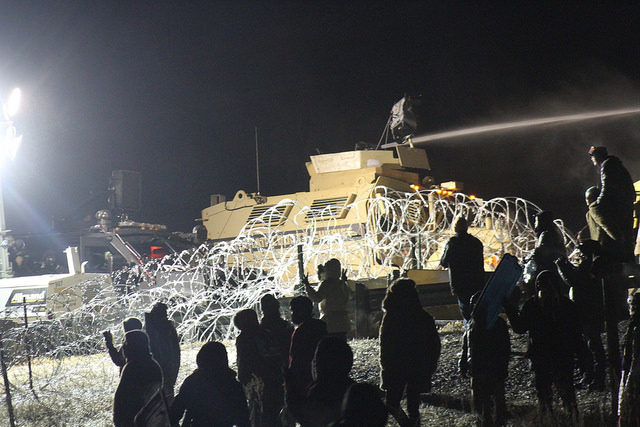The continuing actions of those opposed to the Dakota Access Pipeline (DAPL), who call themselves water protectors, continues to draw attention. The Episcopal Church has gone on record as formally supporting the indigenous peoples’ actions near Standing Rock against the pipelines path through their sovereign territory and land they consider sacred.
In a recent article, the UK based news magazine, the Economist has highlighted the the Episcopal church’s role and especially the efforts of the Rev John Floberg.
“If there is one individual who personifies Christian support for the indigenous protests, it is the Reverend John Floberg, who is responsible for Episcopal (Anglican) parishes on the North Dakota side of Standing Rock.
He co-ordinated the actions of 500 clergy and lay people from 20 different religious groups who gathered at the camp on November 3rd, and he has persuaded his own denomination’s leadership, including Michael Curry, the African-American presiding bishop of the Episcopal church, to play an active part in opposing the line’s completion. Although the Episcopal church is firmly on the liberal side of America’s religious spectrum, this is still new territory for a religious group which for years was the spiritual home of the nation’s social and cultural elite.”
Similar to #Black Lives Matter, #NoDAPL has sharply highlighted the militarization of police forces in the United States and the many systemic and institutionalized ways that American culture and government devalues the lives of persons of color. Along with the Episcopal Church, the United Methodist Church has also formally stated its opposition to the pipeline drawing on their understanding of Stewardship as defined in their Social Principles: “The whole earth is God’s good creation and as such has inherent value. We are aware that the current utilization of energy resources threatens this creation at its very foundation. As members of The United Methodist Church we are committed to approach creation, energy production, and especially creation’s resources in a responsible, careful, and economic way”
Bishop Bruce Ough, who heads the Dakotas-Minnesota Episcopal Area of the UMC, speaks of the issue as a defining moment for American Christians to stand on the side of justice and reconciliation; “this may be the moment God is giving us all to come together, not as antagonists in bondage to our traumatic past, but as mutually empowered advocates for the common good and the sacredness of the waters and all of life. This may be the moment God has given us to use our power to define a just and life-giving future.” He has also “linked the pipeline controversy to a “spiritual battle” over much broader issues, including respect for the indigenous understanding of sacred land. “This is a protest about the stewardship of God’s creation and justice for the indigenous peoples of the Great Plains.”
image: by Dark Sevier on Flickr under CC license

